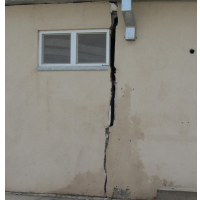DynCorp Wins Big Pentagon Contract Despite “Unsatisfactory” Rating
 Kunduz army garrison exterior structural failure, Building 603 (latrine), March 2012 (photo: SIGAR)
Kunduz army garrison exterior structural failure, Building 603 (latrine), March 2012 (photo: SIGAR)
DynCorp of West Virginia, one of the largest military contractors in Afghanistan, was awarded a $72.8 million contract to train pilots for the Air Force about one week after the special inspector general for reconstruction called the company’s earlier work at the Kunduz army base “unsatisfactory.”
The Special Inspector General for Afghanistan Reconstruction (SIGAR) wrote a scathing report in 2010 and a followup this year which found “serious soil stabilitity issues . . . structural failures, improper grading, and new sink holes” that threatened the well-being of troops stationed there. One sink hole was found near an electrical power transformer, whose failure “would result in a loss of electrical power over a large portion of Camp Pamir, causing significant financial loss and increasing the risk of injury through fire and electrical shock,” the report said.
Despite the negative reviews, the government settled with DynCorp and paid it $70.8 million for its work and released it from future contractural liability. “This was clearly a final settlement between USACETAN and DynCorp that appears to be on unfavorable terms to the U.S. government,” the inspector general concluded.
DynCorp disagreed with the inspector general’s 2010 findings and dismissed the more recent followup that found a worsening condition because “this contract was closed out last year so we are unable to comment on 2012 site conditions that may or may not exist today.”
The U.S. Army Corps of Engineers said it is conducting an “in-depth review of the rationale for the settlement.”
The Kunduz project is a critical step in preparing the Afghan military to take over operations after the scheduled U.S. withdrawal in a few years. The Kunduz base is expected to house around 195,000 personnel by the end of the year. Auditors told Bloomberg News that the base problems disrupted training exercises and forced Afghan troops into temporary quarters which exposed them to freezing cold, sewage problems and unsafe food storage.
DynCorp does extensive work for the military. One-third of its $3.1 billion in 2009 revenues came from State Department contracts for security, training and aviation services, and the company inked a $1.04 billion contract in 2010 to train the Afghan National Police, beating out Blackwater.
But it is no stranger to controversy. The Project on Government Oversight (POGO) lists 10 instances of company misconduct, including settlement of a whistleblower lawsuit in which DynCorp agreed to pay $7.7 million to resolve allegations that it submitted inflated claims for the construction of camps in Iraq.
The State Department’s own inspector general filed a report that alleged DynCorp provided inadequate operations and maintenance support at Camp Falcon in Kabul, Afghanistan, and ought to reimburse the government $157,000 for food service overcharges submbitted for November 2009 through January 2010.
Three DynCorp security guards were fired for drinking and whoring while protecting Afghan President Hamid Karza in 2005.
–Ken Broder
To Learn More:
“Unsatisfactory” Mega-Contractor Re-Ups on Another Big Military Deal (by Spencer Ackerman, Wired)
DynCorp Let Off Hook by U.S. for Poor Work, Audit Finds (by Tony Capaccio, Bloomberg Businessweek)
Contractors Behaving Badly Mean Headaches for US (by Richard Lardner, Associated Press)
U.S. Army-Led NATO Command Shredded 4 Years of Records of Afghan Army Fuel Purchases (by Noel Brinkerhoff, AllGov)
Kunduz Ana Garrison: Army Corps of Engineers Released DynCorp of All Contractual
Obligations Despite Poor Performance and Structural Failures (Special Inspector General for Afghanistan Reconstruction) (pdf)
- Top Stories
- Unusual News
- Where is the Money Going?
- Controversies
- U.S. and the World
- Appointments and Resignations
- Latest News
- Donald Trump Has a Mental Health Problem and It Has a Name
- Trump Goes on Renaming Frenzy
- Trump Deports JD Vance and His Wife
- Trump Offers to Return Alaska to Russia
- Musk and Trump Fire Members of Congress






Comments